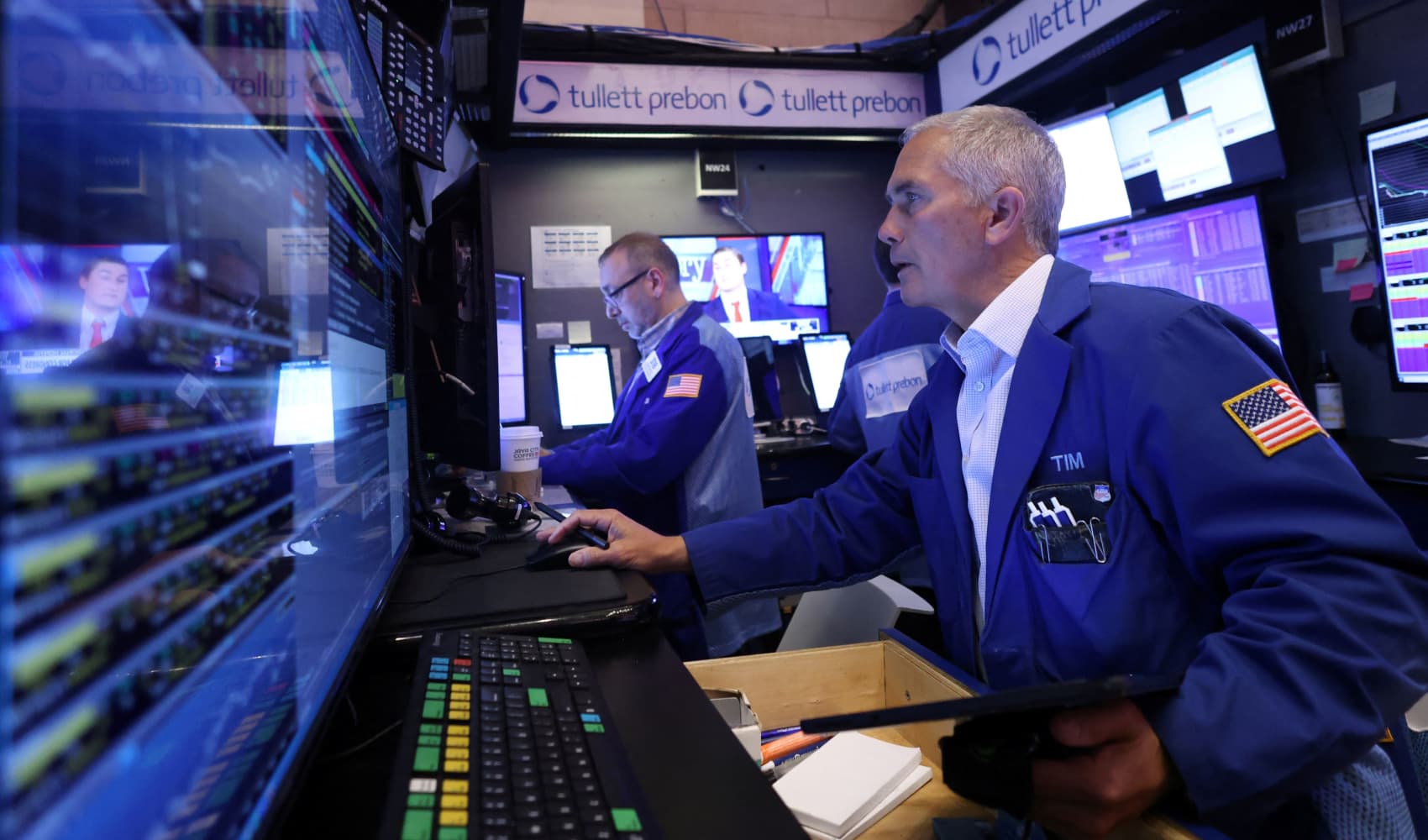
This is CNBC's live blog covering Asia-Pacific markets.
Asia-Pacific traded higher on Monday, as investors looked ahead to another major earnings week on Wall Street, including the likes of Charles Schwab, Bank of America and Morgan Stanley.
The quarterly earnings reports would shed light into the overall health of the financial sector in the U.S. following the collapse of Silicon Valley Bank and how that would shape the U.S. Federal Reserve's tightening cycle.
Hong Kong's Hang Seng index led gains in the region and climbed 1.73%, while in mainland China, the Shanghai Composite traded 1.42% higher to close at 3,385.6. The Shenzhen Component rose 0.46% and ended the day at 11,855.48, ahead of China's gross domestic product report on Tuesday.
Get Philly local news, weather forecasts, sports and entertainment stories to your inbox. Sign up for NBC Philadelphia newsletters.
Economists polled by Reuters expect to see a 4% rise year-on-year for the first quarter of 2023, higher than the final quarter of last year. That would mark the biggest rise in nearly a year.
In Australia, the S&P/ASX 200 was up 0.27% to close at 7,381.5, extending its performance from last week's gain of nearly 2% with all 11 sectors finishing the week higher. In Japan, the Nikkei 225 inched up 0.07% to end at 28,514.78 and the Topix rose 0.41% finish at 2,026.97.
South Korea's Kospi erased earlier losses and gained 0.17%, ending Monday at 2,575.91 and the Kosdaq closed 0.63% higher at 909.5.
Money Report
U.S. stocks ended Friday's trading session lower as the market entered its earnings season. The Dow Jones Industrial Average about 0.42%, while the S&P 500 fell 0.21% and the Nasdaq Composite slid 0.35% to end the week
— CNBC's Sarah Min and Alex Harring contributed to this report
Stringent U.S. lending standards could bring on 'significant tightening' conditions, strategist says
Aninda Mitra, head of Asia macro and investment strategy at BNY Mellon Investment Management, said he expects to see 'significant tightening" in financial conditions, brought on by more stringent lending standards in the U.S.
Both U.S local and regional banks are still struggling to ensure funding beyond the 12 month window provided by the U.S. Federal Reserve's bank term funding program, he told CNBC "Squawk Box Asia."
He added key indicators like the purchasing managers index do show a tightening of lending standards, with the U.S. manufacturing sector in contraction.
"Our central view right now is that, a sequential slowdown in the U.S. is pretty much unavoidable, we have more than an even chance of that materializing," said Mitra. "In the event it's delayed, we'll see an even harder landing next year."
— Lim Hui Jie
Dollar index rises after bank earnings top expectations
The dollar index climbed to 101.73 in Asia morning trade on heightened expectations for the Federal Reserve to hike rates in its upcoming May meeting after banks on Wall Street posted earnings that largely beat expectations.
Asian currencies weakened accordingly, with the Japanese yen weakening by 0.2% to 134 against the U.S. dollar and the Chinese yuan weakening to 6.8750 against the greenback.
The Korean won also weakened by 0.6% to 1,311.45 against the U.S. dollar while the Australian dollar slightly strengthened to 0.6711 against the greenback.
"Even though the U.S. dollar has fallen to a 12-month low .. we will actually see additional data improvements in the following months of reports, and the market will start reconsider that the Federal Reserve won't be lowering interest rates in the third quarter," BK Asset Management's Kathy Lien told CNBC Squawk Box Asia on Monday.
— Jihye Lee
Indonesia exports and imports fall in March
Indonesia's exports and imports both declined in March compared with a year ago, dropping 11.33% and 6.26%, respectively.
The fall is smaller than economists expected, who forecasted a drop of 15% and 14.45%, respectively.
Still, this marked a steep fall from February's figures, which saw exports grow by 4.51% and imports shrink by just 4.32%.
The country's trade surplus also narrowed to $2.91 billion in March, down from February's revised figure of $5.46 billion and lower than economists expectations of $3.99 billion.
— Lim Hui Jie
CNBC Pro: Want to invest in gold? Skip mining stocks, strategist says, and trade this instead
Gold prices are up 12% this year and investment banks expect them to continue to rise.
Catherine Doyle, an investment specialist at London-based Newton Investment Management, reveals her preferred way to get exposure to the commodity.
CNBC Pro subscribers can read more here.
— Ganesh Rao
People's Bank of China leaves 1-year medium-term lending facility unchanged
China's central bank left its 1-year medium-term lending facility operation unchanged at 2.75%.
The People's Bank of China conducted liquidity injections of 170 billion yuan, smaller than market consensus of 220 billion yuan and higher than the maturity amount of 150 billion yuan.
The moves "signal that the PBOC is not particularly worried about the recovery of the Chinese economy," ING's greater China chief economist Iris Pang said in a note.
— Jihye Lee
China's economy expected to have grown 4% in first quarter: Reuters poll
China's economy is expected to have grown 4% in the first quarter of this year, according to a Reuters poll of economists.
This comes after the fourth quarter of 2022 saw growth of 2.9% and would mark the highest growth in a year, after China's GDP rose 4.8% year-on-year in the first quarter of 2022.
Quarter-on-quarter, the economy is forecast to have expanded 2.2% on a seasonally adjusted basis after the reading was flat in the previous period.
China is slated to release its GDP report on Tuesday. The Chinese onshore yuan slightly weakened to 6.8772 in Asia's Monday morning trade.
— Jihye Lee
Singapore's March non-oil domestic exports posts sixth straight month of decline
Singapore's March non-oil domestic exports fell 8.3% year-on-year, marking its sixth straight month of decline.
However, the decline was smaller than February's 15.8% drop, and also below economists expectation of a 20.8% fall.
Government data revealed non-oil domestic exports to Singapore's top markets as a whole declined in March, except to the U.S. and South Korea.
Non-oil domestic exports to Taiwan declined the most in March, falling 30.4% compared to last year, followed by Malaysia at a 23.1% drop, and China was down 14.1%.
— Lim Hui Jie
China home prices in March see biggest monthly rise in 21 months
China's new home prices in March fell 0.8% year-on-year, according to Refinitiv's calculations of the National Bureau of Statistics' house price data of 70 cities released on Saturday.
Home prices fell the least since June 2022, when the reading fell 0.5% year-on-year.
March's reading marks a 0.5% month-on-month rise in comparison to a 0.3% rise in February, marking the fastest pace of gains in 21 months, according to Reuters.
"We expect more housing easing in the months ahead, but maintain our view that the property sector recovery should be gradual and bumpy," Goldman Sachs economists said in a weekend note, citing demographic trends and tight financing conditions for developers.
— Jihye Lee
IMF sees scope for BOJ to tweak yield target in 2023: Reuters
The International Monetary Fund sees scope for Bank of Japan to tweak its bond yield target this year on rising prospects the country could see durable wage increases, according to Reuters.
IMF's Japan mission chief Ranil Salgado noted Japan's wage dynamics were ''changing'', following talks between big firms and unions.
He also highlighted the BOJ should maintain its ultra-loose monetary policy, echoing governor Kazuo Ueda's position. This is because, he added, a sustainable 2% inflation target is not yet in sight.
— Lim Hui Jie
CNBC Pro: Should investors buy regional bank stocks? A bull and a bear weigh in — and share 3 top picks
U.S. regional banks largely sold off after the collapse of Silicon Valley Bank in March.
Should you buy the dip or steer clear of the uncertainty?
A bull and a bear on U.S. regional banks faced off on CNBC's "Street Signs Asia" on Thursday and shared their stock picks — including one big bank stock and two regional names.
CNBC Pro subscribers can read more here.
— Weizhen Tan
Chicago Fed President: Latest economic data shows inflation moving in 'right direction,' but there's still ways to go
While the latest batch of economic data shows positive developments on the inflation front, Chicago Federal Reserve President Austan Goolsbee said the central bank's job is not over just yet.
"When you see the producer prices coming in as big negative numbers and you see these negatives on retail sales, you don't want to overreact to short-run news, but it feels like that's moving in the right direction," he said on CNBC's "Squawk Box" Friday to Steve Liesman.
Goolsbee, who succeeded Charles Evans in the president role earlier this year, is a member of the Federal Open Market Committee, which sets the federal funds rate.
— Alex Harring
CNBC Pro: Analysts love these 15 cheap stocks — and give one 250% upside
Stocks are climbing, and tech stocks in particular have been a bright spot despite the market volatility brought on by the banking crisis, with the Nasdaq up around 16% so far this year — beating the S&P 500 and the Dow Jones Industrial Average.
But investors still have to contend with uncertainty as analysts warn of a recession this year.
But there's opportunity in the chaos, with a number of companies trading at steeper discounts on a price-to-earnings basis than they have in recent history. CNBC Pro screened for such stocks with big upside.
CNBC Pro subscribers can read more here.
— Weizhen Tan
Citigroup joins parade of bank results topping expectations
Citigroup shares gained more than 2% in premarket trading as it too appeared to top expectations from Wall Street on Friday.
The bank reported $21.45 billion in revenue versus $19.986 billion expected, according to analysts polled by Refinitiv.
The bank's $4.6 billion in net income for the period compares to $4.3 billion in the same period last year
Citigroup reported earnings of $2.19 per share for the quarter, while it was not clear how comparable that number is to estimates, it appeared to be a well above expectations.
JPMorgan, Wells Fargo and Citigroup are all up in the premarket after reporting generally better-than-expected results.
-John Melloy, Jesse Pound
JPMorgan Chase jumps 4% after beating on top and bottom line
JPMorgan Chase shares jumped in premarket trading after the bank reported record revenue for the first quarter that was above expectations. Earnings per share also beat Wall Street's estimates.
JPMorgan reported adjusted earnings of $4.32 per share for the first quarter vs. a $3.41 estimate from analysts polled by Refinitiv. Revenue for the first quarter was a record $39.34 billion vs. a $36.19 billion consensus estimate from Refinitiv.
"The U.S. economy continues to be on generally healthy footings—consumers are still spending and have strong balance sheets, and businesses are in good shape," stated CEO Jamie Dimon in the earnings filing. "However, the storm clouds that we have been monitoring for the past year remain on the horizon, and the banking industry turmoil adds to these risks."
-John Melloy, Hugh Son
Next week opens the floodgates for first quarter earnings reports
Almost six times as many companies in the S&P 500 report latest quarter earnings next week as released results in the week just ended (10).
Although bank and financial companies results are sprinkled throughout the week (including a lot of regional banks, from MTB to CFG to CMA), the first of the big technology numbers are released next Wednesday LRCX TSLA FFIV IBM).
Earnings next week:
Monday SCHW STT JBHT MTB
Tuesday LMT BK JNJ GS PLD UAL NFLX OMC
Wednesday CFG GL USB ELV SYF TRV BKR NDAQ ABT MS DFS EFX LRCX LVS TSLA ZION FFIV KMI IBM CCI STLD
Thursday CMA T TFC ALK DHI FITB KEY SNA GPC AXP HBAN MMC PM POOL UNP NUE PPG STX CSX WRB ISRG
Friday FCX RF PG SLB
— Scott Schnipper






